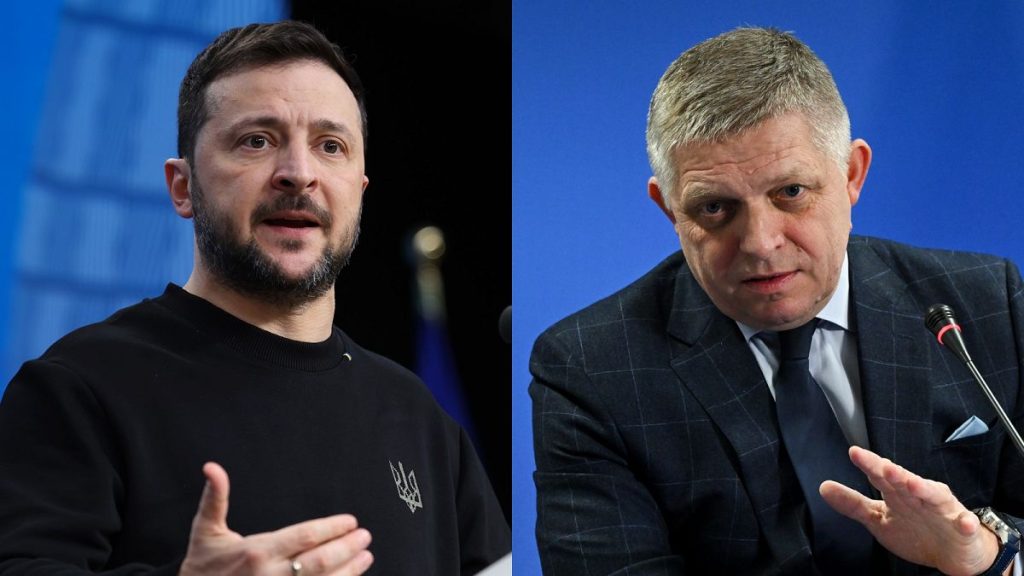The energy dispute between Ukraine and Slovakia, sparked by Ukraine’s decision to halt Russian gas transit, has escalated into a bitter diplomatic standoff with personal attacks and threats of retaliatory measures. At the heart of the conflict lies Ukraine’s refusal to renew a gas transit agreement with Russia’s Gazprom, citing its unwillingness to allow Russia to profit from the ongoing war. This decision, while supported by the European Commission, has placed Slovakia, heavily reliant on Russian gas imports, in a precarious position. Slovak Prime Minister Robert Fico has vehemently criticized Ukraine’s move, warning of severe economic consequences for both Slovakia and the broader European Union. The disagreement has been further exacerbated by Fico’s visit to Moscow to meet with Vladimir Putin, a move condemned by many as undermining European solidarity against Russia’s aggression.
The dispute has spiraled beyond the immediate energy concerns, morphing into a war of words and escalating tensions between the two neighboring countries. Fico has threatened a range of retaliatory actions against Ukraine, including halting electricity supplies, withdrawing humanitarian aid for Ukrainian refugees, and vetoing EU support for Kyiv. He has accused Zelenskyy of causing “enormous damage” to Slovakia and the EU through the gas transit decision. Zelenskyy, in turn, has mocked Fico’s recent luxury vacation and criticized his engagement with Putin as a “losing bet,” accusing him of resorting to “PR, lies, and loud accusations” to deflect blame. The personal attacks and increasingly acrimonious rhetoric have further complicated efforts to find a resolution to the gas transit impasse.
Adding to the complexity is the disagreement over the venue for potential negotiations. Fico initially proposed a meeting near the Ukrainian border in Slovakia, emphasizing the urgency of finding a solution to mitigate the economic fallout of the disrupted gas transit. He explicitly stated his intention to avoid escalating tensions further, choosing not to respond directly to Zelenskyy’s critical social media post. However, Zelenskyy countered with a curt invitation for Fico to visit Kyiv, a proposition that appears unlikely to be accepted given the current state of hostility. The deputy speaker of the Slovakian Parliament has indicated that such a visit is “not possible.” The stalemate over the location for talks further underscores the depth of the rift between the two leaders.
The dispute between Ukraine and Slovakia reflects the broader challenges facing Europe as it seeks to reduce its dependence on Russian energy while maintaining energy security for its member states. Slovakia’s reliance on Russian gas highlights the vulnerability of some EU countries to Moscow’s energy leverage. Ukraine’s decision to halt transit, while understandable given the context of the ongoing war, has exposed these vulnerabilities and created friction within the EU. The situation underscores the need for a coordinated European approach to energy security that addresses the specific needs of individual member states while upholding the principles of solidarity and support for Ukraine.
The escalating tensions between Ukraine and Slovakia also raise concerns about the potential for further fragmentation within the EU. The public airing of grievances and threats of retaliatory measures undermine the unity needed to effectively address the challenges posed by the war in Ukraine and the broader geopolitical landscape. The dispute serves as a reminder of the potential for internal divisions within the EU to be exploited by external actors seeking to weaken the bloc. Finding a resolution to the gas transit dispute and repairing the strained relationship between Ukraine and Slovakia is therefore crucial not only for the two countries involved but also for the overall stability and cohesion of the European Union.
The future of the gas transit dispute remains uncertain. While both sides acknowledge the need for a solution, the deep mistrust and personal animosity between Zelenskyy and Fico make a swift resolution unlikely. The disagreement over the location for talks further complicates matters. The European Commission faces the difficult task of mediating between two member states with conflicting interests while also upholding its commitment to supporting Ukraine and reducing reliance on Russian energy. The outcome of this dispute will have significant implications not only for Ukraine and Slovakia but also for the broader European energy landscape and the EU’s ability to maintain a united front in the face of external challenges.

